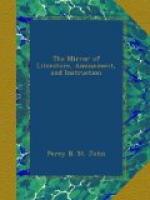It is related by Laud, in his Diary, that when he was standing one day, during dinner, near his unfortunate master, then Prince Charles, the prince, who was in cheerful spirits, talking of many things as occasion offered, said, that if necessity compelled him to choose any particular profession of life, he could not be a lawyer; “for,” said he, “I can neither defend a bad cause, nor yield in a good one.” “Sic in majoribus succedas, in aeternum faustus!” was the aspiration which his faithful servant and fellow victim breathed, when he recorded this trait of Christian character in private notes, which, beyond all doubt, were never intended to be seen by any eyes but his own. Even then, the practice had become so much an exercitation of subtlety, on the part of its professors, to the utter disregard of its original end and object, that, as Donne strongly expressed himself, the name of “law” had been “strumpeted.” It has been asked, if this be the fault of the men or of the institutions—of the lawyers or of the law? and maintained that the original fault is in the law: a conclusion more charitable than satisfactory; for, by whom has the law been made what it is, but by the lawyers?
By the Roman laws, every advocate was required to swear that he would not undertake a cause which he knew to be unjust, and that he would abandon a defence which he should discover to be supported by falsehood or iniquity. This is continued in Holland at this day; and if an advocate brings forward a cause there, which appears to the court plainly iniquitous, he is condemned in the costs of the suit: the example will, of course, be very rare; more than one, however, has occurred within the memory of persons who are now living. The possible inconvenience that a cause just in itself might not be able to find a defender, because of some strong and general prejudice concerning it, is obviated in that country by an easy provision: a party who can find no advocate, and is nevertheless persuaded of the validity of his cause, may apply to the court, which has, in such cases, the discretionary power of authorizing or appointing one.—Ibid.
* * * * *
RICH AND POOR.
The most rational, the wisest, the best portion of mankind, belong to that class who possess “neither poverty nor riches.” Let the reader look around him; let him observe who are the persons that contribute most to the moral and physical melioration of mankind; who they are that practically and personally support our unnumbered institutions of benevolence; who they are that exhibit the worthiest examples of intellectual exertion; who they are to whom he would himself apply if he needed to avail himself of a manly and discriminating judgment. That they are the poor is not to be expected; we appeal to himself, whether they are the rich?—Dymond’s Principles of Morality.




